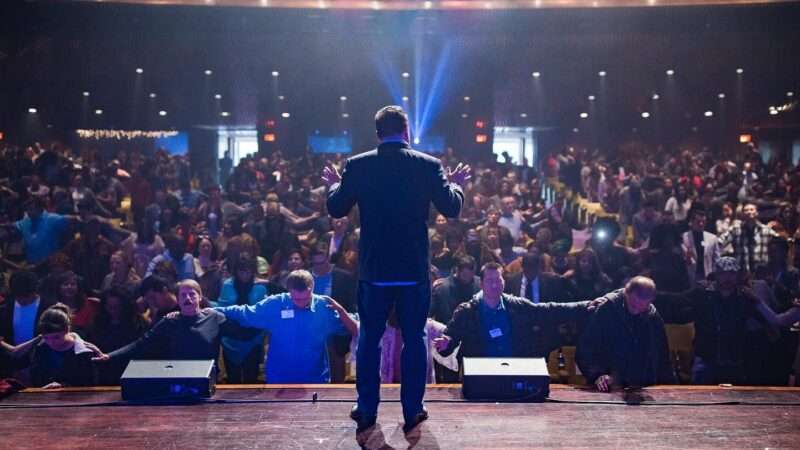

The fate of California church services is now in limbo. In an unsigned order issued December 3, Supreme Court justices granted a petition from Harvest Rock Church of Pasadena, California, and the statewide Harvest International Ministry, to vacate a lower court's ruling against the religious organizations.
Harvest Rock Church and Harvest International Ministry are challenging California Gov. Gavin Newsom's pandemic-related emergency orders that prevent indoor religious services in some parts of the state.
"It is the goal of Harvest Rock Church to protect the first amendment constitutional rights of the church and all people, while taking a specific stand against the misclassification of the worship of God as non-essential during this time of national unrest, economic strife, and physical ailment," says a statement from the church about the lawsuit.
In September, a lower court sided against the church and, in October, the U.S. Court of Appeals for the 9th Circuit denied Harvest Rock's motion for an injunction. But "the September 2 order of the United States District Court for the Central District of California is vacated," states the Supreme Court's new order.
SCOTUS ordered the case to be "remanded to the United States Court of Appeals for the Ninth Circuit with instructions to remand to the District Court for further consideration in light of" Roman Catholic Diocese of Brooklyn v. Cuomo, a recent Supreme Court decision regarding New York shutdown orders. In that decision, issued November 25, the court ruled against New York Gov. Andrew Cuomo's restrictions on religious services.
The Supreme Court's latest order "seems to leave in place for now [California's] substantial limitations, which in some places serve as a ban on indoor services," notes Robert Barnes at The Washington Post. But it also leaves room for the district court to strike them down.
Why the discrepancy between the Court's decision in this case (to simply send it back to a lower court) and the more substantial ruling with regard to New York? It comes down to differing circumstances between California and New York, explains legal blogger Amy Howe:
Emphasizing that COVID-19 cases in California are 'spiking' and that indoor activities are especially risky for the spread of the virus, the state concedes that the church has 'a powerful interest in worshipping in the place and manner of' its choosing. But it stresses that this case is different from the New York challenges because California 'applies the same restrictions to indoor worship as to comparable secular activities involving large groups gathering in close proximity indoors for prolonged periods.' For instance, in its most restrictive zones, the state prohibits indoor gatherings at movie theaters, restaurants, museums and other large spaces, as well as worship services. The state suggested that before the Supreme Court rules on the church's request, it should allow the lower court to 'promptly evaluate' the church's arguments in light of last week's decision in the New York case and 'the current factual and legal circumstances in California.'
But California's argument in the Harvest Rock case may not hold up in light of the state's latest emergency order. The governor's website says that "places of worship" throughout the state can "allow outdoor services only" if they are in a region that drops below 15 percent intensive-care-unit capacity. "In short, all houses of worship [in those areas] will be shut down," notes Volokh Conspiracy blogger Josh Blackman, while "shopping malls stay open at 20 percent capacity."
"The petitioners in Harvest Rock should file a motion for reconsideration, and seek an injunction pending appeal," Blackman suggests. (He delves into the case in much more detail here.)
Whatever happens in the Harvest Rock case, the larger issue here is far from resolved. The Supreme Court has "two other pending requests for relief from COVID-related restrictions, involving houses of worship in New Jersey and a Christian school in Kentucky," notes Howe.
QUICK HITS
• The House of Representatives is scheduled to vote today on the Marijuana Opportunity Reinvestment and Expungement (MORE) Act, which would (among other things) decriminalize marijuana at the federal level. "Friday's vote would mark the first time a full chamber of Congress has taken up the issue of federally decriminalizing cannabis," notes NBC.
• Calling your neighbor a "slumlord" on Facebook is constitutionally protected speech, the Iowa Court of Appeals held this week.
• San Francisco is banning people from smoking cigarettes in their own apartments.
• A new study from South Korea provides more information about COVID-19 spread in indoor spaces:
A study from Korea showing why indoor dining is unsafe and why airborne transmission matters. Case B infected case A from 6.5m (~21 feet!) away in *just five minutes*, and case C from 4.8m (15 feet!). Footage shows no interaction—and only those in line of air flow got infected. pic.twitter.com/Yw3Gb8INWP
— zeynep tufekci (@zeynep) December 3, 2020
• In a very informative new podcast, Sunny Megatron "details the modern history of sexual censorship in the U.S. starting with Miller vs. California in 1973 diving down the rabbit hole of historical events leading us to where we are now."
• Trump still says he'll veto the defense spending authorization bill since it doesn't repeal the internet law Section 230:
Very sadly for our Nation, it looks like Senator @JimInhofe will not be putting the Section 230 termination clause into the Defense Bill. So bad for our National Security and Election Integrity. Last chance to ever get it done. I will VETO!
— Donald J. Trump (@realDonaldTrump) December 4, 2020
… Rep. Justin Amash (L–Mich.) responds:
A win-win for libertarians.
Section 230 not terminated and the NDAA vetoed.
— Justin Amash (@justinamash) December 4, 2020
We're getting close to our Reason Webathon goal! Will you help put us over the top?
Read Entire Article Here: Reason Magazine Articles
via IFTTT
